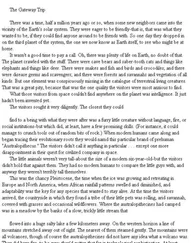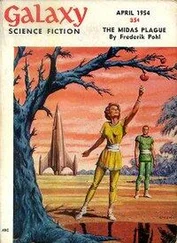Pohl, Frederik - Beyond the Blue Event Horizon
Здесь есть возможность читать онлайн «Pohl, Frederik - Beyond the Blue Event Horizon» весь текст электронной книги совершенно бесплатно (целиком полную версию без сокращений). В некоторых случаях можно слушать аудио, скачать через торрент в формате fb2 и присутствует краткое содержание. Жанр: Старинная литература, на английском языке. Описание произведения, (предисловие) а так же отзывы посетителей доступны на портале библиотеки ЛибКат.
- Название:Beyond the Blue Event Horizon
- Автор:
- Жанр:
- Год:неизвестен
- ISBN:нет данных
- Рейтинг книги:4 / 5. Голосов: 1
-
Избранное:Добавить в избранное
- Отзывы:
-
Ваша оценка:
- 80
- 1
- 2
- 3
- 4
- 5
Beyond the Blue Event Horizon: краткое содержание, описание и аннотация
Предлагаем к чтению аннотацию, описание, краткое содержание или предисловие (зависит от того, что написал сам автор книги «Beyond the Blue Event Horizon»). Если вы не нашли необходимую информацию о книге — напишите в комментариях, мы постараемся отыскать её.
Beyond the Blue Event Horizon — читать онлайн бесплатно полную книгу (весь текст) целиком
Ниже представлен текст книги, разбитый по страницам. Система сохранения места последней прочитанной страницы, позволяет с удобством читать онлайн бесплатно книгу «Beyond the Blue Event Horizon», без необходимости каждый раз заново искать на чём Вы остановились. Поставьте закладку, и сможете в любой момент перейти на страницу, на которой закончили чтение.
Интервал:
Закладка:
And that, she told herself justly as Albert rambled on, was petty of her. Robin had kept no mean secrets. He had told her at once of the love of his life, the woman named Gelle-Klara Moynlin whom he had abandoned in a black hole-had told her, actually, far more than she wanted to know.
She said, “Stop.”
Instantly the three-dimensional figure in the tank abandoned the word it had been speaking in midsyllable. It gazed politely at her, awaiting orders.
“Albert,” she said carefully, “why did you tell me Robin was studying question of black holes?”
The figure coughed. “Why, Mrs. Broadhead,” Albert said, “I have been playing a recording prepared especially for you.”
“Not this time. Why did you volunteer this information other time?”
Albert’s expression cleared and he said humbly, “That directive did not come from my program, gospozha.”
“I thought not! You have been interacting with the psychoanalytic program!”
“Yes, gospozha, as you programmed me to do.”
“And what was the purpose of this intervention from the Sigfrid von Shrink program?”
“I cannot say for sure-but,” he added hastily, “perhaps I can offer a guess. Perhaps it is that the Sigfrid estimates your husband should be more open with you.”
“That program is not charged with care of my mental health!”
“No, gospozha, not with yours, but with your husband’s. Gospozha, if you wish more information, let me suggest that you consult that program, not me.”
“I can do more than that!” she blazed. And so she could. She could speak three words-Daite gorod Polymat-and Albert, Harriet, Sigfrid von Shrink, every one of Robin’s programs would be subsumed into the powerful program of her own, Polymath, the one she had used to write them in the first place, the overriding program that contained every instruction they owned. And then let them try cunning evasions on her! Then let them see if they could maintain the confidentiality of their memories! Then- “God,” Essie said aloud, “am actually planning to teach lesson to my own programs!”
“Gospozha?”
She caught her breath. It was almost a laugh, nearly a sob. “No,” she said, “cancel above. I find no fault with your programming, Albert, nor with shrink’s. If shrink program judges Robin should release internal tensions, I cannot overrule and will not pry. Further,” she corrected herself fairly.
The curious thing about Essie Lavorovna-Broadhead was that “fairness” meant something to her, even in dealing with her constructs. A program like Albert Einstein was large, complex, subtle, and powerful. Not even S. Ya. Lavorovna could write such a program alone; for that she needed Polymath. A program like Albert Einstein learned, and grew, and redefined its tasks as it went along. Not even its author could say why it gave one bit of information and not another. One could only observe that it was working, and judge it by how it carried out its orders. It was unfair to the program to “blame” it, and Essie could not be so unfair.
But, as she moved restlessly among her pillows (twenty-two minutes left!) it came to her that the world was not entirely fair to her. Not fair at all! It was not fair that all these fairytale wonders should be pouring in upon the world-not now. It was not fair that these perils and perplexities should manifest themselves, not now, not while she might not live to see how they came out. Could Peter Herter be dealt with? Would the others of his party be saved? Could the lessons of the prayer fans and the explorers make it possible to do all the things Robin promised, feed the world, make all men well and happy, allow the human race to explore the universe? All these questions, and before this day’s sun had set she might be dead and never to know the answers! It was not fair, any of it. And least fair was that if she died of this operation she would never know, truly, which way Robin would have chosen, if somehow his lost love could be found again.
She became aware that time was passing. Albert sat patiently in the tank, moving only occasionally to suck his pipe or scratch under the hem of his floppy sweater-to remind her, that is, that he was still in standby mode.
Essie’s thrifty cybernetician’s soul was indignantly ordering her to use the program or turn it off-what a shocking waste of machine time! But she hesitated. There were questions still to ask.
At the door the nurse was looking in. “Good morning, Mrs. Broadhead,” she said when she saw that Essie was wide awake.
“Is it time?” Essie asked, her voice suddenly unsteady.
“Oh, not for a few minutes yet. You can go on with your machine if you want to.”
Essie shook her head. “Is no point,” she said and dismissed the program. It was a decision lightly taken. It did not occur to her that some of the unasked questions might be consequential.
And when Albert Einstein was dismissed he did not allow himself to disintegrate at once.
“The whole of anything is never told,” said Henry James. Albert knew “Henry James” only as an address, the information behind which he had never had occasion to seek. But he understood the meaning of that law. He could never tell the whole of anything even to his master. He would fail in his programming if he tried.
But what parts of the whole to select?
At its lowest structural level, Albert’s program was gated to pass items of a certain measured “importance” and reject others. Simple enough. But the program was redundant. Some items came to it through several gates, sometimes as many as hundreds of gates; and when some of the gates said “go’ and others said “no go,” what was a program to do? There were algorithms to test importance, but at some levels of complexity the algorithms taxed even the resources of sixty billion gigabits-or of a universe full of bits; Meyer and Stockmeyer had proved, long ago, that, regardless of computer power, problems existed which could not be solved in the life of the universe. Albert’s problems were not quite that immense. But he could not find an algorithm to decide for him, for instance, whether he should bring up the puzzling implications of Mach’s Principle as applied to Heechee history. Worse. He was a proprietary program. It would have been interesting to pass on his conjectures on the subject to a pure science research program. But that his basic programming did not permit.
So Albert held himself together for nearly a millisecond, reconsidering his options. Should he, next time Robin summoned him, volunteer his misgivings about the potentially terrifying truth that lay behind Heechee Heaven?
He reached no conclusion in all that long one thousandth of a second, and his parts were needed elsewhere.
So Albert allowed himself to come apart.
This part he poured into slow memory, that part into ongoing problems as needed, until all of Albert Einstein had soaked into the 6 x 10 bits, like water into sand, until not even a stain was left. Some of his routines joined with others in a simulated war game, in which Key West was invaded from Grand Cayman. Some turned up to assist the traffic-controller program at Dallas-Fort Worth, as Robin Broadhead’s plane entered its landing pattern. Much, much later, some of him helped to monitor Essie’s vital functions as Dr. Wilma Liederman began to cut. One little bit, hours after, helped to solve the mystery of the prayer fans. And the simplest, crudest, tiniest part of all stayed on to supervise the program that prepared Cajun coffee and beignets for Robin when he arrived, and to see that the house was clean for him. Sixty billion gigabits can do much. They even do windows.
13 At the Halfway Point
To love someone is a grace. To marry someone is a contract. The part of me that loved Essie, was loving her wholeheartedly, sank in pain and terror when she relapsed, surged in fearful joy when she showed signs of recovering. I had plenty of occasion for both. Essie died twice in surgery before I could get home, and again, twelve days later, when they had to go in again. That last time they made her clinically dead on purpose. Stopped heart and breath, kept only the brain alive. And every time they reanimated her I was frightened to think she would live-because if she lived it meant she might die one more time, and I could not stand it. But slowly, painfully, she began to gain weight, and Wilma told me the tide had turned, as when the spiral begins to glow in a Heechee ship at the halfway point and you know you’re going to live through the trip. I spent all that time, weeks and weeks of it, hanging around the house, so that when Essie could see me I would be there.
Читать дальшеИнтервал:
Закладка:
Похожие книги на «Beyond the Blue Event Horizon»
Представляем Вашему вниманию похожие книги на «Beyond the Blue Event Horizon» списком для выбора. Мы отобрали схожую по названию и смыслу литературу в надежде предоставить читателям больше вариантов отыскать новые, интересные, ещё непрочитанные произведения.
Обсуждение, отзывы о книге «Beyond the Blue Event Horizon» и просто собственные мнения читателей. Оставьте ваши комментарии, напишите, что Вы думаете о произведении, его смысле или главных героях. Укажите что конкретно понравилось, а что нет, и почему Вы так считаете.












